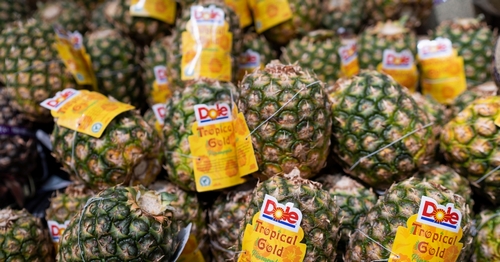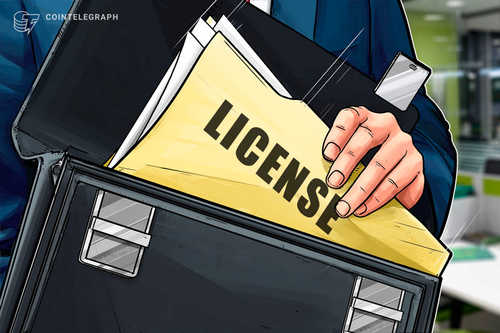The deadline, contained in its sustainability report released Wednesday, charts a system-wide redesign of how Dole, one of the world’s largest fruits and vegetables distributors, traces its food.
Top of mind is improving the speed with which Dole can identify trouble spots in the supply chain during a recall of contaminated products, something it has worked on improving for years through its association with IBM Food Trust.
The Dole Food Company has a five-year blockchain plan for stronger food safety.
Dole aims to launch blockchain product tagging and other “advanced traceability solutions” across its three business divisions – tropical fruits, fresh vegetables and other diversified products – in a bid to enhance food safety operations by 2025.
“Blockchain cuts the average time needed for food safety investigations from weeks to mere seconds”, the report said. “Produce that’s been logged via blockchain can be instantly tracked back through the supply chain, giving retailers and consumers confidence in the event of a recall.”
Distributed data could make investigations more nimble, Dole said in the report. It will also use that data to make consumers more informed. Dole said it plans to “eventually” pull back the curtain on its supply chain with scannable vegetable packages that reveal the product’s “journey from farm to store shelf.”
This was something Dole said it had already been doing with its salad and fresh vegetable supply chain, according to the report. The company claimed it was already sharing this data with retail customers last year, although it built protections into its platform to prevent different retailers from seeing their competitors’ data.
Now, it intends to soon launch blockchain systems for other products. Dole’s plan does not give a timeline on specific initiatives.
The 2025 goal comes nearly three years after Dole began experimenting with distributed ledgers as a member of IBM’s food blockchain consortium, the precursor to IBM Food Trust.

Dole appeared ready to continue that partnership through at least the next five years. The report notes fellow consortium member Walmart and IBM, the group’s cornerstone, are both working with Dole to showcase blockchain’s potential “to bring about a step change in food safety.” An IBM spokesperson declined to comment on Dole’s strategic planning.
A spokesperson for Dole did not respond to a request for comment by press time.
Government food watchdogs have been taking notice of blockchain. The U.S. Food and Drug Administration’s (FDA) upcoming “New Era of Smarter Food Safety” blueprint will advocate for the implementation of “blockchain technologies”, said FDA commissioner Stephen Hahn in a February speech.
Deputy Commissioner for Food Policy and Response Frank Yiannas, who has played a leading role in developing that FDA blueprint, previously ran Walmart’s food safety operation where he worked closely with the IBM Food Trust.
While at Walmart, he spearheaded an effort to have leafy green providers use IBM Food Trust tools to trace their goods end-to-end – also in an effort to more quickly track potentially contaminated foods.
Digix and MakerDAO Tokens Now Loadable Onto Monolith Visa Debit Card
London-based banking alternative Monolith announced its partnership with decentralized finance companies Digix and MakerDAO, Aug. 15. As part of its drive for digital payment adoption in e-commerce, DGX, DGD and DAI tokens will now be loadable onto the Monolith Visa debit card.
A critical bridge between the worlds of decentralized finance and retail
Effective immediately, users who sign up for a Monolith Visa debit card will be able to load it up with MakerDAO and Digix’s digital currencies through the Monolith mobile app. The currencies can then be used for everyday purchases, bill payments and to send and receive money.
CEO of MakerDAO, Rune Christensen commented:
“Monolith’s solution provides a powerful way for token holders to extend the usefulness of their crypto-holdings. … Their cards create a critical bridge from the world of DeFi to the more traditional world of retail.”
Rebrand marks the end of beta, and ramping up for growth
If this seems like deja vu, it may be because Cointelegraph reported a similar story almost two and a half years ago. Back then Monolith announced a partnership with Digix on the launch of the TokenCard Visa debit card.
However, that has now been re-labeled an extended beta test and the card has changed names to the Monolith Visa debit card. Monolith CEO, Mel Gelderman commented:
“We’re thrilled to have had a fantastic response from our beta users and are now ramping up for growth. Rebranding to Monolith helps us achieve our mission of democratizing finance and bringing the Token economy to everyone while providing a unique service to our customers.”
There are now plans to bring further tokens into the monolith ecosystem.
Earlier this year, Bitcoin debit card Shift closed down operations.


